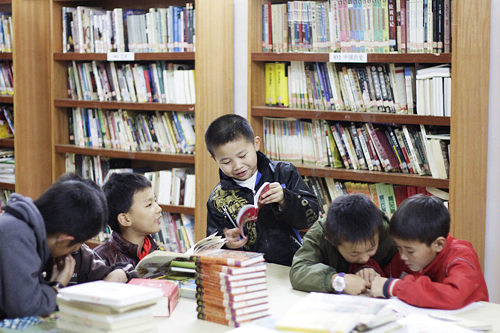 |
|
COMMUNICATION CENTER: A boy discusses a book with his friends in the Huang Kan Library in Qichun County, Hubei Province (CFP) |
Teachers in the Qingshi Middle School are very supportive of the library.
"My teacher encouraged the students to go to the library often. She said that while the books might not be useful in getting high marks in the exams, they would have long-term benefits," said Cai Xiaohai, who graduated from the Qingshi Middle School this summer.
In addition to offering a place for reading books, the library also shows films and holds various activities such as lectures by visiting scholars.
"We want it to be a communication center for the students. They can express their ideas here and learn things they can't learn from academic classes," Li said.
Cai used to attend the Economics class for Middle School Students in the library regularly. The class explains many seemingly sophisticated economic theories in a very understandable way by connecting them to people's daily lives.
"Every time I went to the class I learnt a lot," Cai said. "Before attending the class, I didn't even know what economics was. The class made me realize it is relevant to everyone of us."
Encouraged by his trips to the library, Cai, together with several schoolmates, founded a newspaper. They named the newspaper The Generation and Cai spent 200 yuan ($31.46) buying an old computer and managed to put together four issues of the publication.
"We hope that through the library, students will be able to expand their horizons and take action when they have new ideas," Li said.
As the first library of the CRL program, Huang Kan Library has drawn a great deal of attention. "I know people have doubts about whether our program can sustain and many think I am a bit idealistic," Li said. "You shouldn't expect things to be smooth, of course not."
Tan said she had encountered many difficulties in running the Gan Quan Library.
"Before I went there, I thought the local people would be happy to have a library, and that we would be welcome as it's such a wonderful project," Tan said. "But the reality was that they were indifferent toward our presence and the teachers in the school didn't want to talk to us as they believed the books we offer could not help the students to get higher marks in exams."
It's also a surprise to Tan that many students said they wanted the school to be even stricter with them. "But it is understandable as going to college seems to be the only way for them to find a better future," Tan said
Tan has done her best to win over the teachers and began offering reading classes to the students. "We have to prove that reading books in the library would actually help improve their exam marks."
The CRL program has also managed to set up reading stations in some village primary schools, but the efforts ended in failure. "Those schools don't want to spare time and efforts on maintaining the reading stations and we don't have spare volunteers to operate them," Li said.
Speaking of all the difficulties encountered, Li said he never felt frustrated. "Of course we will have problems. We are here to make an effort to solve them."
According to Li, there are now 33 full-times volunteers and five part-time volunteers working in 10 CRL libraries all over the country. One volunteer, a graduate from China Agricultural University, has been with the program for more than two years. All the volunteers' salaries are paid with donations.
"The salary is not high at all," Tan said. "In the first three months after I joined the program, I got 600 yuan ($94.51) per month. After three months, the number doubles, but its still not high."
Despite this, Tan said she would continue working for the CRL program. "I am still very optimistic to its future," she said.
"We are not alone," Li said. In April 2010, he attended a conference on charity education in rural areas in China and met people from more than 80 other similar programs. "It is a big group involved in these programs. 'Rome was not built in a day.' I will spend my whole life working on this and I'm sure things will gradually get better." | 